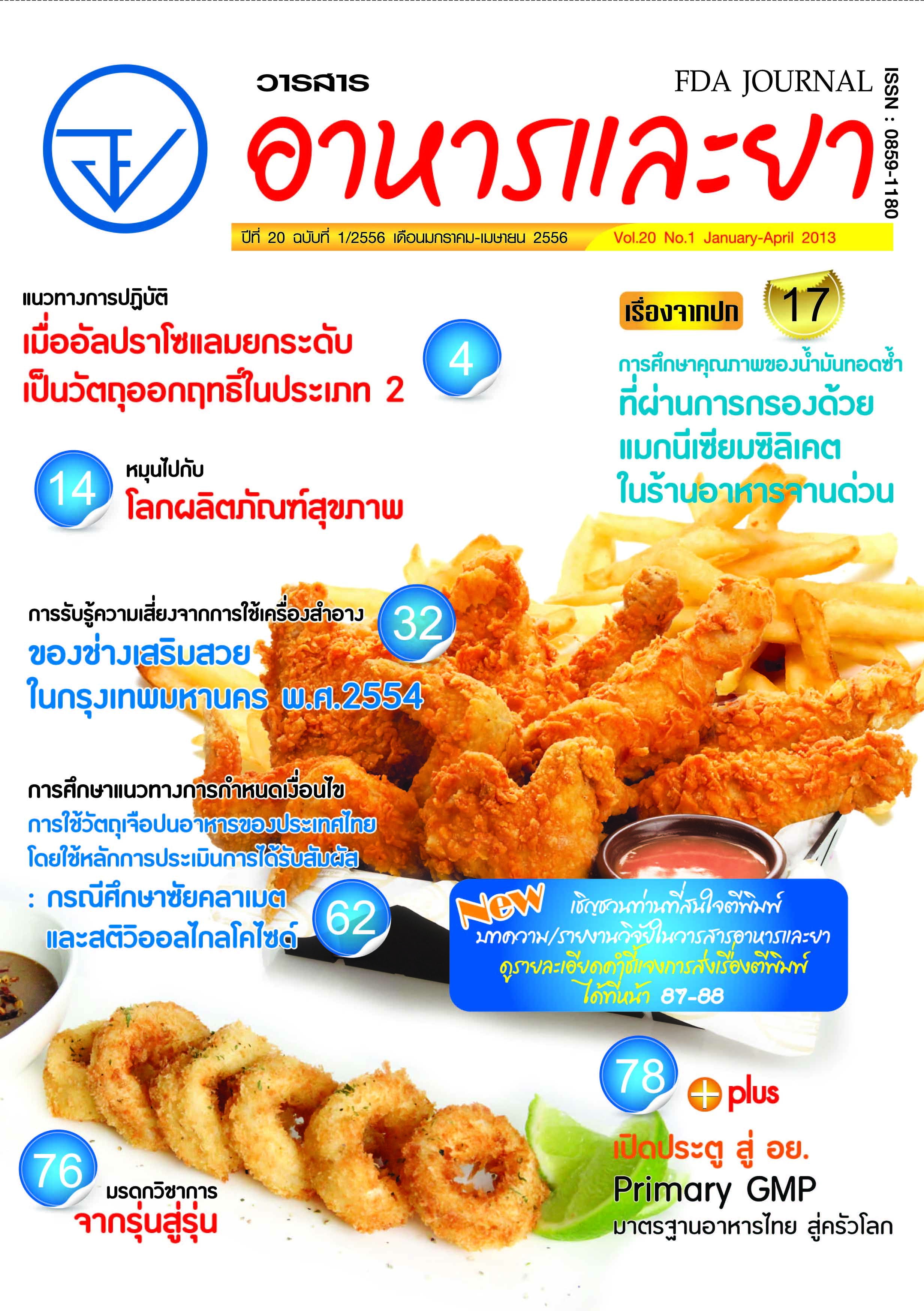พฤติกรรมการบริโภคผลิตภัณฑ์เสริมอาหารของนักเรียนระดับมัธยมศึกษาตอนปลายของโรงเรียนในเขตตรวจราชการที่ 2 กระทรวงสาธารณสุข
Main Article Content
บทคัดย่อ
ผู้บริโภคส่วนมากจะซื้อผลิตภัณฑ์เสริมอาหารตามข้อมูลที่ได้รับจากสื่อโฆษณาและบุคคลรอบข้างโดยไม่ได้ศึกษาข้อมูล
ที่ถูกต้อง จนบางครั้งตกเป็นเหยื่อของการโฆษณา การวิจัยเชิงสำรวจนี้จึงมีวัตถุประสงค์เพื่อศึกษาช่องทางการรับรู้ข่าวสาร
เกี่ยวกับผลิตภัณฑ์เสริมอาหาร ศึกษากลุ่มอ้างอิงที่มีผลต่อการตัดสินใจบริโภคผลิตภัณฑ์เสริมอาหาร ศึกษาความรู้เกี่ยวกับ
ผลิตภัณฑ์เสริมอาหารและพฤติกรรมการบริโภคผลิตภัณฑ์เสริมอาหาร เปรียบเทียบค่าเฉลี่ยพฤติกรรมการบริโภคผลิตภัณฑ์เสริม
อาหารตามตัวแปร เพศ การเป็นสมาชิก อย.น้อย ผลการเรียนเฉลี่ยของนักเรียน และศึกษาความสัมพันธ์ระหว่างพฤติกรรมการ
บริโภคผลิตภัณฑ์เสริมอาหารกับความรู้เกี่ยวกับผลิตภัณฑ์เสริมอาหาร รายได้เฉลี่ยต่อเดือนของผู้ปกครองและรายได้เฉลี่ยต่อวัน
ของนักเรียน โดยทำการศึกษาในกลุ่มตัวอย่างจำนวน 1,450 คน ซึ่งเป็นนักเรียนมัธยมศึกษาตอนปลายของโรงเรียนในเขตตรวจ
ราชการที่ 2 กระทรวงสาธารณสุข ใน 4 จังหวัด ได้แก่ ชัยนาท สิงห์บุรี ลพบุรี และอ่างทอง เก็บรวบรวมข้อมูลตั้งแต่เดือนมีนาคม
ถึงสิงหาคม 2553 โดยใช้แบบสอบถามและวิเคราะห์ข้อมูลด้วยสถิติเชิงพรรณนา ได้แก่ ความถี่ ร้อยละ ค่าเฉลี่ย ส่วนเบี่ยงเบน
มาตรฐาน และสถิติเชิงอ้างอิง ได้แก่ การทดสอบค่าที การวิเคราะห์ความแปรปรวน และค่าสัมประสิทธิ์สหสัมพันธ์เพียร์สัน
ผลการศึกษาพบว่า กลุ่มตัวอย่างส่วนใหญ่มีการรับรู้ข่าวสารเกี่ยวกับผลิตภัณฑ์เสริมอาหารผ่านทางโทรทัศน์และกลุ่ม
อ้างอิงที่มีผลสูงสุดต่อการตัดสินใจบริโภคผลิตภัณฑ์เสริมอาหาร คือ พ่อแม่ นอกจากนี้ยังพบว่า กลุ่มตัวอย่างมีความรู้เกี่ยวกับ
ผลติ ภณั ฑเ์ สรมิ อาหารและมคี ะแนนเฉลยี่ พฤตกิ รรมทถี่ กู ตอ้ งในการบรโิ ภคผลติ ภณั ฑเ์ สรมิ อาหารอยใู่ นระดบั ปานกลาง โดยพบวา่
เพศชายมีพฤติกรรมการบริโภคผลิตภัณฑ์เสริมอาหารที่ถูกต้องมากกว่าเพศหญิงอย่างมีนัยสำคัญทางสถิติที่ระดับ 0.05 ทั้งยัง
พบว่า พฤติกรรมการบริโภคผลิตภัณฑ์เสริมอาหารที่ถูกต้องมีความสัมพันธ์ทางบวกในระดับต่ำกับทั้งความรู้เกี่ยวกับผลิตภัณฑ์
เสริมอาหารของนักเรียนกล่มุ ตัวอย่าง และรายได้เฉล่ยี ต่อเดือนของผ้ปู กครองและรายได้เฉล่ยี ต่อวันของกล่มุ ตัวอย่าง อย่างมี
นัยสำคัญทางสถิติที่ระดับ 0.05 ซึ่งผลการวิจัยครั้งนี้ จะสามารถนำไปประยุกต์ใช้ในกิจกรรมต่างๆ ในการพัฒนาศักยภาพ
ผู้บริโภคและการคุ้มครองผู้บริโภคของเขตตรวจราชการที่ 2 กระทรวงสาธารณสุขและสำนักงานคณะกรรมการอาหารและยา
และสามารถใช้เป็นแนวทางให้ผู้ปฏิบัติงานที่เกี่ยวข้องในการพัฒนากลวิธีการลดพฤติกรรมการบริโภคผลิตภัณฑ์เสริมอาหาร
อย่างไม่สมเหตุสมผล


